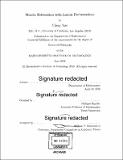Matrix estimation with latent permutations
Author(s)
Mao, Cheng, Ph. D. Massachusetts Institute of Technology
DownloadFull printable version (12.18Mb)
Other Contributors
Massachusetts Institute of Technology. Department of Mathematics.
Advisor
Philippe Rigollet.
Terms of use
Metadata
Show full item recordAbstract
Motivated by various applications such as seriation, network alignment and ranking from pairwise comparisons, we study the problem of estimating a structured matrix with rows and columns shuffled by latent permutations, given noisy and incomplete observations of its entries. This problem is at the intersection of shape constrained estimation which has a long history in statistics, and latent permutation learning which has driven a recent surge of interest in the machine learning community. Shape constraints on matrices, such as monotonicity and smoothness, are generally more robust than parametric assumptions, and often allow for adaptive and efficient estimation in high dimensions. On the other hand, latent permutations underlie many graph matching and assignment problems that are computationally intractable in the worst-case and not yet well-understood in the average-case. Therefore, it is of significant interest to both develop statistical approaches and design efficient algorithms for problems where shape constraints meet latent permutations. In this work, we consider three specific models: the statistical seriation model, the noisy sorting model and the strong stochastic transitivity model. First, statistical seriation consists in permuting the rows of a noisy matrix in such a way that all its columns are approximately monotone, or more generally, unimodal. We study both global and adaptive rates of estimation for this model, and introduce an efficient algorithm for the monotone case. Next, we move on to ranking from pairwise comparisons, and consider the noisy sorting model. We establish the minimax rates of estimation for noisy sorting, and propose a near-linear time multistage algorithm that achieves a near-optimal rate. Finally, we study the strong stochastic transitivity model that significantly generalizes the noisy sorting model for estimation from pairwise comparisons. Our efficient algorithm achieves the rate (n- 3 /4 ), narrowing a gap between the statistically optimal rate Õ(n-1 ) and the state-of-the-art computationally efficient rate [Theta] (n- 1/ 2 ). In addition, we consider the scenario where a fixed subset of pairwise comparisons is given. A dichotomy exists between the worst-case design, where consistent estimation is often impossible, and an average-case design, where we show that the optimal rate of estimation depends on the degree sequence of the comparison topology.
Description
Thesis: Ph. D., Massachusetts Institute of Technology, Department of Mathematics, 2018. Cataloged from PDF version of thesis. Includes bibliographical references (pages 151-167).
Date issued
2018Department
Massachusetts Institute of Technology. Department of MathematicsPublisher
Massachusetts Institute of Technology
Keywords
Mathematics.